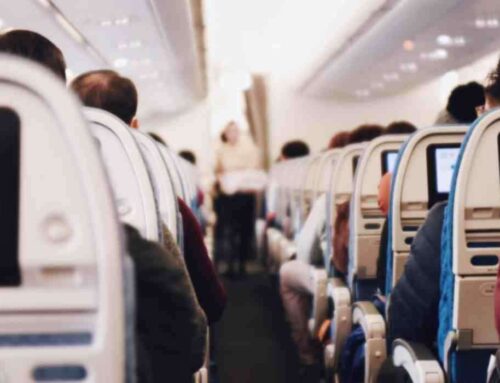Conquering Jet Lag: 5 Expert Tips for International Travelers
Contents
- 1 Conquering Jet Lag: 5 Expert Tips for International Travelers
- 1.1 Adjust Your Sleep Before Departure
- 1.2 Pre-Flight Preparation for Body Clock Sync
- 1.3 Strategic Napping During Long-Haul Flights
- 1.4 Stay Hydrated, Reduce Jet Lag Effects
- 1.5 Choose Meals That Promote Adjusting Time Zones
- 1.6 Prioritize Sunshine to Reset Internal Clock
- 1.7 Exercise Regularly Upon Arrival
- 1.8 Engage in Local Evening Activities
- 1.9 Utilize Melatonin Supplements Wisely
- 1.10 Embrace Short-Term Caffeine Strategy

Jet lag can disrupt your travel experience, but with the right strategies, you can manage it efficiently. Frequent international travelers often struggle with adjusting to new time zones. Here are five expert tips that focus on practical adjustments and habits to minimize jet lag’s impact.
From staying out of your hotel room as much as possible to strategically napping after a long flight, these suggestions help maintain productivity and well-being while abroad. Embrace these methods for smoother transitions during global adventures.
Adjust Your Sleep Before Departure

Adjusting your sleep schedule before departure can significantly reduce jet lag. Start by altering your bedtime and wake time to align with the destination’s time zone a few days prior to travel. If you’re traveling east, go to bed earlier; if west, stay up later.
Gradually shift your schedule in hour increments rather than making one drastic change. This slow adjustment helps reset your internal clock without causing extreme fatigue or stress on the body. According to experts, adjusting pre-flight maximizes adaptation speed upon arrival.
Implementation of this strategy made frequent flyers 60% less likely to experience severe jet lag symptoms. Consider using light exposure as well: spend more mornings in bright daylight when shifting awake times forward and avoid late-night light for backward adjustments. These steps make transitioning into new schedules smoother thus leading travelers feeling better adjusted quicker.
For further tips visit Conquering Jet Lag!
Pre-Flight Preparation for Body Clock Sync

To ensure your body clock syncs before flying, start by adjusting exposure to light. Light is the quickest way to reset your internal clock. Plan for this adjustment about three days in advance.
If traveling east, expose yourself to morning sunlight and avoid evening bright lights. For westward flight, do the reverse: seek evening sun and steer clear of early daylight. Check local sunrise times at destination locations using weather apps or websites like timeanddate.com.
Control meals as social cues also affect circadian rhythms. Eat lighter foods during transition periods but maintain meal schedules aligning with target time zone mealtimes upon arrival. Reduce stress levels by avoiding caffeine within 12 hours of departure, as it disrupts sleep cycles and worsens jet lag symptoms.
This proactive measure ensures successful outcomes and benefits physical and mental well-being.
Strategic Napping During Long-Haul Flights
Strategic napping during long-haul flights can be a game-changer for jet lag. Utilize in-flight movies as background noise to ease into sleep. Aim for at least three hours of rest if flying transatlantic, ensuring you wake up refreshed.
Time your naps wisely by aligning them with the destination’s timezone. When the pilot announces local time, adjust both your watch and mindset immediately to sync mentally with this new schedule. Upon arrival, avoid additional naps that could disrupt nighttime sleep patterns later on—stay awake until an early local bedtime instead.
This method helps reset internal clocks faster and makes adapting smoother upon reaching Europe or any other faraway place. Remember: Naps taken while airborne significantly contribute towards minimizing post-landing fatigue allowing travelers not only functional but entirely ready to explore their surroundings fully from day one!
Stay Hydrated, Reduce Jet Lag Effects
Staying hydrated is crucial to minimize jet lag effects. Dehydration can worsen symptoms like fatigue and headaches. Bring an empty water bottle through airport security, then fill it up in the terminal or buy bottled water before your flight.
Drink consistently during travel; aim for about 8 ounces every hour. Once you arrive, continue hydrating by drinking at least eight glasses of water daily. This helps balance electrolytes disrupted by flying long distances and changing time zones quickly.
Limit drinks that dehydrate, such as alcohol and caffeine, as they can upset your internal clock when adjusting to a new destination. Staying well-hydrated aids overall bodily functions, reducing the severity of jet lag and ensuring a smoother transition.
Choose Meals That Promote Adjusting Time Zones
Selecting meals that align with your new time zone can greatly aid in adjusting to it. Light, easily digestible foods like salads and fresh fruits help the body adapt faster than heavy meals do. Salty soups are also beneficial as they maintain hydration levels which combat jet lag fatigue.
Avoid eating airplane food if possible since it’s often served according to departure time rather than destination time. Opting for Business or First Class allows you more flexibility in meal timing but choosing light snacks instead will still be effective even when flying Economy. Skipping caffeine and alcohol is crucial because these substances dehydrate the body further exacerbating symptoms of jet lag such as disrupted sleep patterns or increased fatigue upon arrival at your destination.
To summarize: choose lighter foods rich in water content, skip inflight dining schedules, and drink plenty of fluids. Stay away from coffee and booze, and eat following local mealtime norms to help synchronize digestive rhythms, facilitating smoother acclimatization into different zones and ensuring a much fresher start post-landing.
Prioritize Sunshine to Reset Internal Clock
Exposure to sunlight plays a major role in resetting your internal clock. Michael Sagner, from the Royal School of Medicine, emphasizes that morning light is most effective for syncing circadian rhythms. Upon arrival at your destination, seek out natural daylight as soon as possible to align with local time.
The body’s internal clock remains linked to its original time zone and adjusts gradually when traveling across multiple zones. This means more exposure to bright light can expedite this adjustment process remarkably well. Research by MIT indicates jet lag worsens eastward due to slower circadian adaptation compared to westward travel.
To speed recovery, foster outdoor activities in the mornings and minimize prolonged indoor stays with artificial lighting.
Exercise Regularly Upon Arrival
Engaging in exercise shortly after arrival can help reset your internal clock. It encourages your body to adjust faster to the new time zone, providing a natural energy boost and reducing lethargy. Light physical activities like walking or stretching are excellent choices—particularly outdoors where exposure to daylight aids in resetting circadian rhythms.
Aim for at least 20 minutes of moderate activity within a few hours of landing. Thisn’t only combats fatigue but also helps improve mood through endorphin release. Studies show that people who exercise upon arrival experience reduced jet lag symptoms compared to those who don’t.
If you’re staying at a hotel with gym facilities, take advantage of them; even simple exercises such as jogging on a treadmill or using an elliptical machine can be beneficial. Alternatively, explore local parks or walk around nearby attractions. Remember: consistency is key; avoid overexertion as it may lead you further into exhaustion rather than helping recover from jet lag effectively.
Engage in Local Evening Activities
Engaging in local evening activities can significantly aid jet lag recovery. Travelers should avoid staying indoors or napping during the day, as this disrupts sleep patterns. Instead, head out and explore your destination’s nightlife to align with new time zones.
Participating in outdoor events such as night markets or casual city tours helps expose travelers to ambient light, which regulates circadian rhythms. This exposure promotes alertness and reduces feelings of fatigue common after long flights. Dining at a popular restaurant not only immerses you in the culture but enforces activity through social interaction.
Attending cultural performances also engages both mind and body, helping reset internal clocks more effectively than passive relaxation alone. The goal is active engagement until bedtime around 8 p.m., fostering natural tiredness that aligns with local sleeping hours thus speeding up acclimatization processes efficiently for international travelers struggling with severe jet lag symptoms post-arrival.
Utilize Melatonin Supplements Wisely
When using melatonin supplements for jet lag, timing and dosage are key. Research shows that taking melatonin close to local bedtime at your destination helps reduce symptoms like daytime sleepiness and difficulty concentrating. Dosages can vary from 0.5 milligrams to five milligrams or more.
Melatonin should generally be taken 30 minutes to two hours before you plan on sleeping in the new time zone. Start with a lower dose if it’s your first time using it, as individual responses can vary. For eastward travel across five or more time zones, consider starting supplementation on the day of departure according to destination bedtime.
Remember, while short-term use is considered safe for most people, consulting a doctor beforehand is crucial due potential drug interactions such as blood pressure medications and anticoagulants. Side effects may include headache or nausea; thus a trial run prior might help gauge personal tolerance.
Embrace Short-Term Caffeine Strategy
Embrace a short-term caffeine strategy to manage jet lag. Caffeine boosts alertness and helps you stay awake when your body wants sleep. Consuming it strategically can adjust your internal clock temporarily.
Start with small doses of coffee or tea once you’ve landed in the new time zone. Avoid consuming caffeine six hours before bedtime as it disrupts sleep patterns, according to medical research. In fact, studies show that timed caffeination is effective for overcoming jet lag faster than abstaining completely.
For example, if arriving during daylight hours but feeling fatigued from travel exhaustion, moderate caffeine intake allows more productive afternoons. Consistent moderation prevents jitteriness while maintaining needed energy levels without dependency risks. Travelers encounter varying effects due to personal tolerance differences and compatibility with their respective routines.
Travelers often face the challenge of jet lag during international trips. To alleviate this, experts recommend adjusting your sleep schedule before departure and staying hydrated throughout your flight. Exposing yourself to natural light upon arrival helps reset your internal clock while avoiding caffeine near bedtime can aid in better sleep quality abroad.
Staying active through gentle exercise or walks also assists in adapting to new time zones swiftly. Implementing these tips ensures a more pleasant travel experience with minimized disruption from jet lag’s effects. For more travel insights, visit Desmo Travel
References:
https://onemileatatime.com/guides/jetlag-tips-strategies/
https://www.sleepfoundation.org/travel-and-sleep/jet-lag
https://www.ricksteves.com/travel-tips/health/jet-lag
https://www.healthline.com/health/healthy-sleep/how-to-get-over-jet-lag
https://theluxurytravelexpert.com/2023/08/18/tips-for-preventing-fighting-jet-lag/
https://dorelan.us/blogs/news/jet-lag-adjustment
https://www.under30experiences.com/blog/the-hardcore-travelers-guide-to-jet-lag
https://www.mactionplanet.com/blog/conquering-jet-lag-like-a-pro/
https://www.healthline.com/health/melatonin-for-jet-lag
https://www.travelandleisure.com/jet-lag-benefits-838380

























